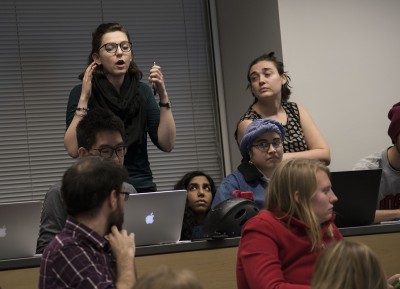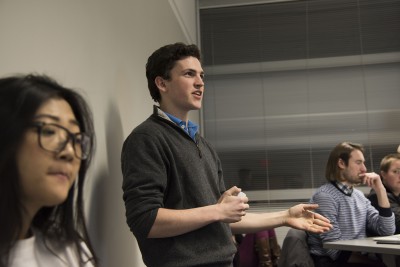
The Boston University Constitution Reform Committee did not reach an agreement on a constitutional referendum during a Monday night meeting and eventually voted to maintain BU Student Government’s current structure and constitution.
Committee members Jacob Brewer, College of Engineering Senator Nadia Asif and SG President Andrew Cho each wrote a proposal, all of which were presented at the meeting. Approximately 60 BU students were in attendance.
After shortlisting the choices to Asif and Cho’s proposals, the vote failed to reach the required two-thirds majority vote and the CRC decided to pursue the status quo.
Unlike SG’s existing unicameral legislative body, all proposals presented advocated for a bicameral student government.
“All legislative powers herein granted shall be vested a bicameral legislature consisting of the Upper House and the Lower House,” Asif’s and Cho’s draft constitutions stated.
Staffed by the Student Council, a new body of elected student representatives according to the proposed constitution, the Upper House would have functioned similar to SG’s current Senate and convened bi-weekly. The Lower House would have included every undergraduate student “in good judicial standing” and convened in the weeks between the Upper House’s meetings, according to the drafts.
Asif’s proposal, however, differed to that of Brewer and Cho’s, with the former emphasizing the “buddy system” and the latter emphasizing contributions through town hall meetings, said Desmond Molloy, a freshman in the Sargent College of Health and Rehabilitation Sciences.
“Under Nadia’s proposal, any student can choose to send a proposal they write either to the Lower or Upper House,” Molloy said during the meeting. “They only need 26 people to vote, as opposed to the circumstance of the student body. Normally, the smaller body — the Student Council, the Upper House — [conducts] the oversight. The larger body votes on proposals.”
Cho, a senior in the College of Arts and Sciences, said after the meeting that the bicameral system “guarantees that students can win” and would have benefited all parties at the cost of minor inefficiencies.
“We shouldn’t be thinking ‘Upper House versus Lower House,’” Cho said during the meeting. “It’s not meant to be oppositional.”
Responding to the meeting’s outcome, Cho said he was “pretty disappointed,” as the outcome did not embody the efforts spent over the past six weeks.
“But again, I can’t argue against it,” he said. “We weren’t able to reach compromise.”
The CRC had started a weekly discussion to produce a new SG Constitution since its first meeting Jan. 25 until its fifth Feb. 23.

BU Students Against Silence member Noor Toraif said a lot of time and compromises had been put into preparing the proposals.
“It is really disappointing, because we all [have agreed] from the task force that the Student Government, especially the Senate, was no longer representative [of the student body],” Toraif, a senior in CAS, said. “Because it doesn’t mean two-thirds and says ‘Nothing should happen,’ [it] doesn’t really represent the majority of the task force just because we set a rule that there should be a two-thirds vote.”
The CRC was created during a Senate meeting in response to problems within SG following the impeachment of two SG Executive Board members, The Daily Free Press reported Dec. 1, 2015.
Several attendees said they disapproved of the meeting’s outcome, as it failed to reach the CRC’s objective.
Molloy said the committee “copped out” and did not produce the outcome it had been striving for.
“The student body expected a result, and the Committee basically threw up its hands and said, ‘We weren’t feeling like it,’” he said. “It’s not the result the majority of the committee was hoping for. It feels, though, that there were many members who did not want any outcome at all.”
Hanaan Yazdi, a sophomore in CAS, said the entire reform process attempted to ameliorate SG’s current situation, but all efforts ended up futile in the meeting.
“I think it’s very, very unfortunate that this body was built, was created to fix a broken system, not just to go back to an old broken system,” she said. “We don’t have enough trust in the current system.”
Lauren Blackburn, a Warren Towers senator and a freshman in CAS, said the meeting could motivate SG to reflect on itself and improve in the future.
“I’m kind of disappointed that we weren’t able to reach compromise, but that’s just how democracy works sometimes,” she said. “It’s not necessarily what anyone wanted, but there’s nothing we can really do at this point to change it.”